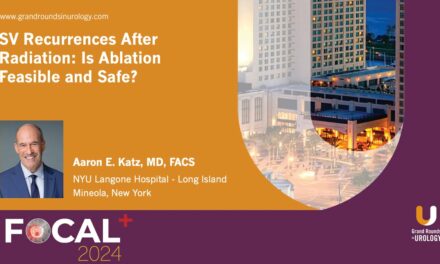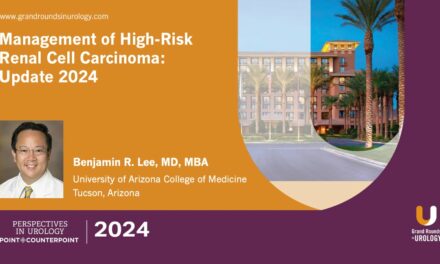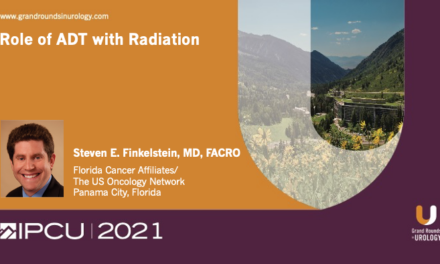How to cite: Stewart, Tyler F. “Neoadjuvant Therapy for Localized Upper Tract Urothelial Carcinoma.” March 10, 2023. Accessed Sep 2025. https://grandroundsinurology.com/neoadjuvant-therapy-for-localized-upper-tract-urothelial-carcinoma/
Neoadjuvant Therapy for Localized Upper Tract Urothelial Carcinoma – Summary
Tyler F. Stewart, MD, analyzes how neoadjuvant chemotherapy options involving cisplatin or carboplatin affect upper tract urothelial carcinoma (UTUC) patients. Dr. Stewart first reviews UTUC patient outcomes, transitioning to a discussion of the POUT trial. He highlights the POUT trial’s study of cisplatin- and carboplatin-based adjuvant chemotherapies in UTUC patients following radical nephroureterectomy (RNU), noting the trial’s discovery of significant improvement in disease-free survival.
However, Dr. Stewart expresses concern with the trial’s gemcitabine-carboplatin results while emphasizing the slightly more preferable outcomes of gemcitabine-cisplatin. He sheds light on additional concerns, explaining that RNU affects cisplatin eligibility.
Dr. Stewart then discusses upstaging UTUC after RNU. He continues by evaluating the favorable results of a 2023 study involving gemcitabine and split-dose cisplatin. Dr. Stewart also analyzes other neoadjuvant chemotherapy options, including atezolizumab as studied by the ImVigor010 trial and nivolumab as studied by the CheckMate 274 trial. He pinpoints the negative results of the ImVigor010 trial, contrasting this with nivolumab’s potential as a UTUC neoadjuvant chemotherapy and FDA approval under certain conditions.
However, Dr. Stewart notes concerns with nivolumab and emphasizes the need for further study. Ultimately, Dr. Stewart highlights the benefits of perioperative cisplatin chemotherapy in comparison to carboplatin while promoting caution during the treatment of T1 patients.
About the 30th Annual Perspectives in Urology: Point Counterpoint conference: Presented by Program Chair and Grand Rounds in Urology Editor-in-Chief E. David Crawford, MD, this conference brought together leading experts in urology, medical oncology, and radiation oncology to discuss and debate the latest topics in genitourinary cancers, primarily prostate cancer and bladder cancer. This interactive conference offered topical lectures, pro/con debates, interesting-case presentations, interactive panel discussions, and interactive audience and faculty networking.




